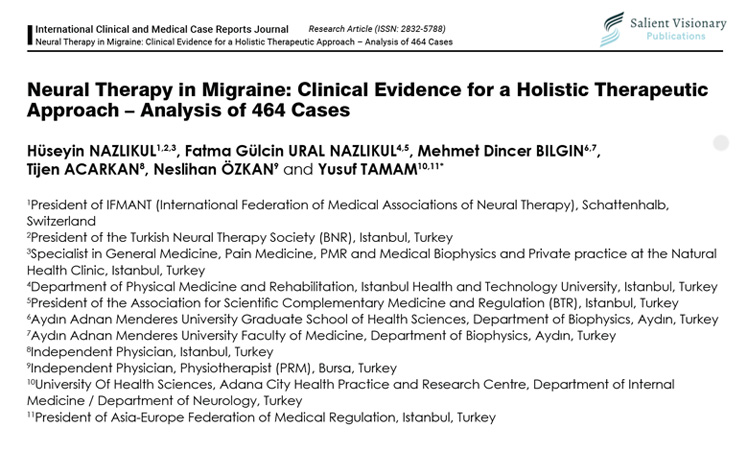Neural Therapy in Migraine: Clinical Evidence for a Holistic Therapeutic Approach – Analysis of 464 Cases
Hüseyin NAZLIKUL 1,2,3, Fatma Gülcin URAL NAZLIKUL 4,5, Mehmet Dincer BILGIN 6,7, Tijen ACARKAN 8, Neslihan ÖZKAN 9 and Yusuf TAMAM 10,11*
ABSTRACT
Background: Migraine is one of the most common neurological disorders and significantly impairs quality of life. While conventional therapies may alleviate symptoms, they often fail to address the underlying causes. Neural therapy is a therapeutic approach in which local anesthetics such as procaine or lidocaine are not primarily used for analgesia but rather to modulate the autonomic nervous system, particularly its sympathetic branch. This method aims to restore functional balance and stabilize dysregulated networks through segmental and systemic reflex pathways, thereby supporting a holistic regulatory effect.
Objective: This retrospective study aims to evaluate the effectiveness of neural therapy in 464 migraine patients using a holistic, regulatory medical approach.
Methods: Patient history forms were analyzed for hormonal dysregulation, intestinal dysbiosis, temporomandibular dysfunction, C2 vertebral blockage, hydration status, and interference fields. Additionally, clinical treatment progressions were statistically assessed.
Results: Over 91% of patients demonstrated clinical improvement, and 60% became symptom-free. The most frequently observed contributing factors were intestinal dysbiosis (89%), hormonal imbalance (71%), and temporomandibular/C2 dysfunctions (43% each).
Conclusion: Neural therapy is an effective and regulatory therapeutic option for migraines, particularly in chronic, multifactorial cases. Its integration into a holistic treatment strategy may yield substantial clinical benefits.
DOI: https://doi.org/10.5281/zenodo.15262178
View / Download PDF |